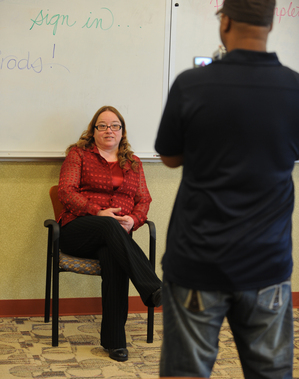Washtenaw Community College helps workers in transition overcome barriers to success
Rana Khalili is a waitress who dreams of hosting a culinary arts show.
Like thousands of other adults, the 46-year-old has turned to college to find a better life in hard economic times, enrolling in the culinary arts program at Washtenaw Community College.
To accommodate the needs of first-time students like her, WCC began offering a workshop in the fall called On Course. In once-weekly sessions, Khalili learned about studying and test taking, as well as skills like setting a personal budget and planning practical steps toward accomplishing goals.

Ivan Clemens of Ann Arbor talks about being part of Washtenaw Community College's On Course program.
Lon Horwedel | AnnArbor.com
The course is part of a wider effort at WCC to assist workers coming to the college in droves after being out of the classroom for decades. The trend helped WCC's enrollment hit record numbers this fall at almost 14,000 students.
Community college enrollment is up almost 50 percent since 2000, according to state data. Due in part to economically displaced workers seeking career changes, Michigan's 28 community colleges enrolled 261,950 students this fall, a 10 percent increase over fall 2008, according to data from the Michigan Community College Association.
State worker retraining incentives like No Worker Left Behind have also boosted enrollment numbers.
Meanwhile, President Barack Obama has detailed a $12 billion initiative aimed at sending 5 million more Americans to college for degrees or certificates.
WCC's initiatives to support worker retraining have included weekly support groups and workshops for workers in transition, as well as counseling tailored to the group. Many students are coming to the college for the first time after being laid off.
Like other students enrolled in On Course workshops in the fall, Khalili's life included obstacles - like a recent housing crisis.
Keeping a roof over her family's head weighed heavily on Khalili's mind in recent months. A single mother of seven children between the ages of 9 and 23, Khalili said she survives on four hours of sleep a night and lots of coffee.
Taking time to learn about resources and the process has helped her re-focus on her goals, Khalili said.
"Before the class, I thought, 'What do I ask? What do I do?'" she said.
And now? "I will reach my goal. Even if I'm 60 - I'll get what I want."
At the Tuesday evening On Course workshop last fall taught by Jill Beauchamp, a weekly speaker addressed topics like financial aid and available community resources - as well as soft skills like self-awareness and emotional intelligence.
A heavy emphasis also was placed on journaling and discussion.
"Many times, the conversations in class would bring up points that were maybe a little sensitive," Beauchamp said.
One class member's obstacle to attending college had been homelessness.
"She talked about homelessness in class - it made others feel a little uncomfortable, but on the other hand, they are topics that need to be talked about," Beauchamp said. "It enlightened other members in the class who had never gotten that close to it to know someone who had."
WCC President Larry Whitworth and Pat Taylor, dean of academic placement, counseling and support services, pulled together a committee last summer charged with addressing the needs of the growing number of under- and unemployed adults turning to the college for help. The same committee will be assessing the outcomes at a roundtable discussion next week.
For Susan McKenna, the On Course workshop was the in-between step she needed before trying her hand at college life.

Susan McKenna of Milan is videotaped talking about Washtenaw Community College's On Course program Dec. 9 at WCC's Fitness Center. McKenna recently completed the workshop.
Lon Horwedel | AnnArbor.com
McKenna lost her job as a mailroom supervisor for Sodexo on the Pfizer campus in July. Her husband is employed, and they share Milan home with their grown son. But she described mental barriers to attending college.
The thought of returning to school 27 years after she graduated from Ypsilanti High School terrified McKenna. She said she had anxiety over being the oldest student in class and an overwhelming feeling what she had to contribute wasn't worthwhile. As a shy and private person, she liked to listen but never spoke in front of groups, she said.
"I was ready to drop after the first class," she said.
But she started reading the book, "On Course: Strategies for Creating Success in College and in Life," by Skip Downing, a consultant for student success strategies and former college English teacher.
"I decided to stay in the class and I'm really glad I did. I've learned a lot about myself," she said.
McKenna told her classmates it was unimaginable to her before the course that she would be able to speak in front of all of them. And she announced with confidence she felt ready to enroll in WCC's nursing program.
But the course doesn't hold all the answers.
At 50, Ivan Clemens said his future goals are uncertain, but he appreciated the course because it's made him aware of community resources and financial aid sources available to him.
"But I'm still looking for more direction," he said.
On the last day of the Tuesday evening course in December, Beauchamp asked students to choose a spool of colored thread from an assortment, describe why they chose the particular color and how it relates to what they've learned and want to accomplish.
Students mostly chose bright spools - blues and yellows - and related the colors to calm, pride, hope, spirituality and other attributes they now recognize as keys to achieving a better life. Khalili chose her favorite color - black.
She came in upset and late to class that day, lamenting that police knocked on her door to tell the family they had five days left on an eviction notice. One of her younger children took the eviction the notice off the door weeks ago without telling her about it, she said.
Khalili told the story to the class and said she didn't know what to do. As she spoke, classmate Amanda Barrett, herself a single mother of two, wrote names and numbers on a slip of paper and passed it to Khalili.
During the exercise, Khalili held the spool, paused, and said: "It represents the dark days that are now behind me. Now I'm going toward the light."
With the resources suggested by her classmate - including the WCC Student Resource and Women's Center - Khalili learned about her rights as a renter: her family could stay at the home until the lease ended in July, despite the foreclosure. Armed with new information and help, she got the court to intervene.
"This is wonderful," she said by phone. "It's wonderful."
Juliana Keeping covers higher education for AnnArbor.com. Reach her at julianakeeping@annarbor.com or 734-623-2528. Follow Juliana Keeping on Twitter.

